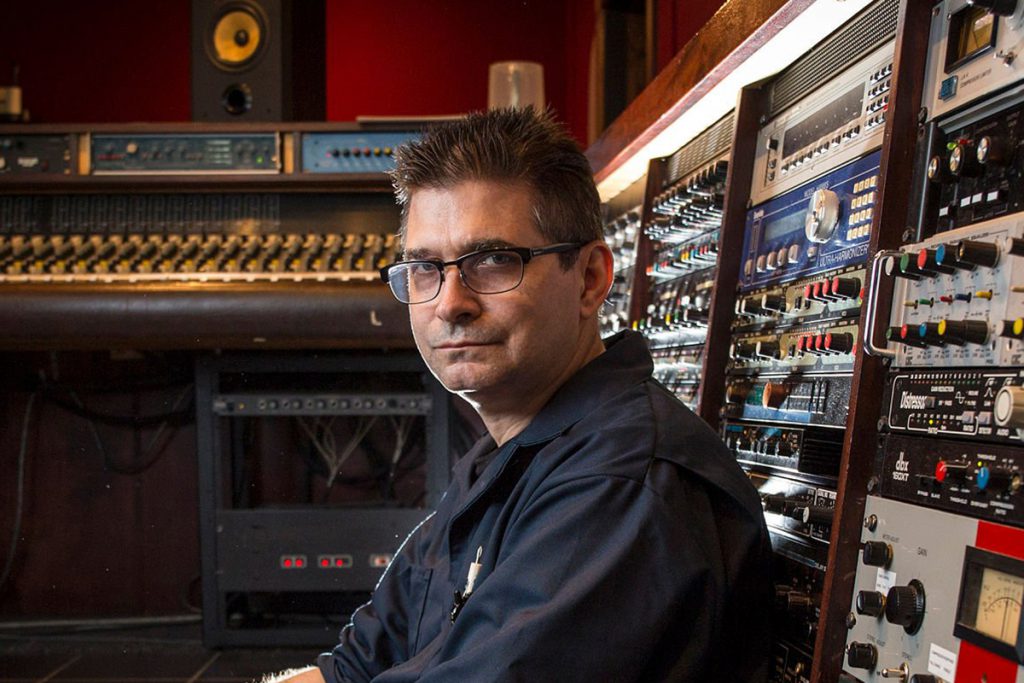Musician and legendary rock producer Steve Albini dead at 61

Steve Albini in his studio in Chicago on July 24, 2014. Brian Cassella/Tribune News Service.
Legendary Chicago producer and musician Steve Albini has died of a heart attack at his recording studio, Electric Audio, Pitchfork reported on Wednesday.
Albini was 61.
The outspoken audio guru (Albini preferred the title “engineer” to “producer”) emerged from the heavy rock scene in the late ’80s as guitarist and vocalist of the bands Big Black and, later, Shellac. In the studio, Albini’s minimal approach to recording earned him coveted spots recording artists like Jimmy Page and Robert Plant, The Pixies, PJ Harvey, Fugazi and The Jesus Lizard.
But Albini’s letter to the members of Nirvana, offering to record the follow-up to their chart-topping sophomore effort, Nevermind, is the stuff of rock and roll legend. In it, Albini nimbly sidesteps all of the rock and roll pretension associated with recording the biggest rock band in the world and suggests he should be paid the same way any other tradesman is compensated.
“I would like to be paid like a plumber: I do the job and you pay me what it’s worth,” Albini wrote. “The record company will expect me to ask for a point or a point and a half. If we assume three million sales, that works out to 400,000 dollars or so. There’s no fucking way I would ever take that much money. I wouldn’t be able to sleep.”
Albini recorded Nirvana’s subsequent album, In Utero, over the course of two weeks in February 1993. The album went on to sell more than 15 million copies.
Albini’s studio philosophy was simple: His job as an engineer was to record the band the way it sounded in the room. A dedicated punk minimalist and a genius at microphone placement, he captured some of the most iconic drum sounds since John Bonham’s set was placed at the foot of staircase at Headley Grange for the thunderous intro to Led Zeppelin’s “When the Levee Break Breaks.” In his letter to Cobain and company, Albini wrote, “99 percent of the sound of a record should be established while the basic take is recorded. Your experiences are specific to your records; but in my experience, remixing has never solved any problems that actually existed, only imaginary ones.”
In a legendary article he titled “The Problem with Music,” Albini laid out his issues with producing.

Steve Albini in ‘A’ room of his studio, Electrical Audio, in Chicago on June 24, 2005. Photo by Paul Natkin/Getty Images.
“The term has taken on perjorative qualities in some circles,” he wrote. “Engineers tell jokes about producers the way people back in Montana tell jokes about North Dakotans. (How many producers does it take to change a light bulb?—Hmmm. I don’t know. What do you think? Why did the producer cross the road?—Because that’s the way the Beatles did it, man.) That’s why few self-respecting engineers will allow themselves to be called ‘producers.'”
Steve Albini was born in Pasadena, Calif., but his family moved to Montana where he discovered punk rock via The Ramones.
Albini attended Hellgate High School in Missoula, alongside RIFF writer Sam Richards and Richards’ sister, Katie.
He was an editor for the school paper, the Lance, and competed on the speech team. He also was in a self-described confrontational “jackhammer punk” band called Just Ducky. Obviously, even at that early stage, he was skeptical of authority, disdained complacency and wasn’t afraid to get up in people’s faces.
“I’ll never forget when my mom and I picked up my sister from a speech meet trip, and Steve went up to my mom and asked, ‘Are you Katie’s maternal unit?’ with all apparent earnestness,” Sam Richards said. “My mom talked about that for years.”
Albini eventually studied journalism in Illinois before becoming part of the Chicago scene in early 1980s. His writing in early zines established his reputation as firebrand curmudgeon who excoriated bands, clubs, show-goers and any other subject that drew his considerable ire. Albini mellowed considerably in later years, and is the subject of countless YouTube videos where he thoughtfully discusses, at length, his various approaches to recording.
Albini was also a champion poker player, a foodie, a recovering ‘“Edgelord” and a decent human being.
Shellac, Albini’s musical vehicle since its formation in 1992, was scheduled to go on tour this summer, and its latest album, To All Trains—the band’s first in a decade—is due out May 17.
